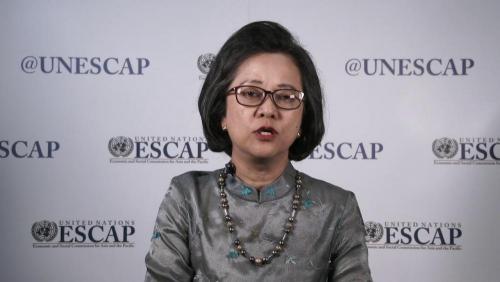
Excellency Mr. Md. Abdul Hamid, President of the People’s Republic of Bangladesh,
Honourable Ministers
Excellencies, distinguished delegates,
Ladies and gentlemen,
I am delighted to welcome you to the Asia-Pacific Conference on Financing for Inclusive and Sustainable Development in Dhaka, Bangladesh.
I wish to express my sincere appreciation to the Government of Bangladesh for co-hosting this Conference with UN ESCAP, along with the International Chamber of Commerce-Bangladesh and the Asian Development Bank. A good participation of policymakers from the ministries of finance and other stakeholders is timely and encouraging.
This Conference provides a valuable opportunity for member States to share insights and ideas into understanding the emerging trends in financing for development to support the implementation of the 2030 Agenda in our region.
The tax revenue mobilization has improved in recent years, with a number of countries making notable progress. There has been a progress in establishing project preparation facilities to develop a pipeline of bankable projects for infrastructure financing. Increasingly, capital markets are playing a significant role to close financing gaps in infrastructure development in Asia and the Pacific.
The region has also shown a great potential to advance the digital economy. The role of Fintech to increase access to financial services, especially for financing of micro, small and medium sized enterprises (MSMEs) is heartening. Making use of software and modern technology, Fintech are bringing down financial transaction costs. It directly promotes women’s economic participation, supports entrepreneurship, enhances financial inclusion, and contributes to poverty reduction.
Excellencies, ladies and gentlemen,
Such sustainable progress, however, is dependent upon the overall regional geo-political, economic and financial environment. In recent months, our region has experienced a number of new and emerging trends that are shaping the financing for development landscape, including rising trade protectionist measures, widening inequality, and increasing climate change related natural disasters, which have had an adverse impact on development gains.
The region’s implementation of the Addis Agenda requires new momentum and accelerated policy actions. Policymakers need to come together and stress the importance of finding innovative ways to mobilize financial resources to achieve the Sustainable Development Goal (SDGs).
ESCAP estimated that the Asia-Pacific developing countries should invest an additional US $1.5 trillion per year, or 5 percent of their combined GDP, to achieve the SDGs by 2030. Today, ambition is the only option in our region.
To unlock resources of such magnitude, the UN Secretary-General has outlined a three-year Roadmap for Financing the 2030 Agenda for Sustainable Development, which focuses on three objectives: Aligning global economic policies and financial systems with the 2030 Agenda; Enhancing sustainable financing strategies and investments at regional and country levels; and Seizing the potential of financial innovations, new technologies and digitalization to provide equitable access to finance.
Excellencies, ladies and gentlemen,
I would like to highlight three priority areas closely linked to the Roadmap for Financing the 2030 Agenda in Asia and the Pacific.
First, let us mobilize additional public funding. It will be necessary to modernize tax systems and improve the efficiency of tax administrations. The increasing importance of new business models and excessive tax competition across countries and tax evasion by multilateral corporations are also causing losses to developing countries’ tax administrations. To address these are common challenges, we need to significantly strengthen regional dialogues and cooperation on tax matters, as they have a direct bearing on the fiscal space to deliver on the 2030 Agenda.
Second, let us improve the planning, implementation and financing of national and cross-border infrastructure projects. To support countries capacities on infrastructure financing, ESCAP has established the Infrastructure Financing and Public Private Partnership Network of Asia and the Pacific. The network, which has thirty members, has facilitated exchanges of experiences and discussions of demonstration projects across countries. Capital markets can help mobilize additional private financing for sustainable infrastructure projects. It can further facilitate in future the issuing of green bonds.
Third, let us enhance financial inclusion and financial technology, and other innovative financing mechanisms. There is a great opportunity to harness Fintech and digital financial services to reach out to MSMEs with a focus on women entrepreneurs. It creates sustainable jobs and improves shared prosperity. ESCAP’s regional programme on “Catalyzing Women’s Entrepreneurship - Creating a Gender-Responsive Entrepreneurial Ecosystem” is an important step forward.
Excellencies, ladies and gentlemen,
ESCAP is fully committed to supporting your efforts to achieve progress in the implementation of the Addis Agenda and 2030 Agenda.
We cannot work alone to advance this agenda. We need strong and sustainable partnerships within the United Nations family including UN Resident Coordinators and UN Country Teams, and other international, regional and subregional organizations, to support member States and all stakeholders to mobilize resources for SDGs in our region
Together, over the next two days and a half, we can come up with solutions-oriented policy actions to raise additional financing resources and accelerate progress in the SDGs.
Thank you all for your contributions to this important regional Conference. I look forward to the outcomes of our interactive deliberations.










Add new comment